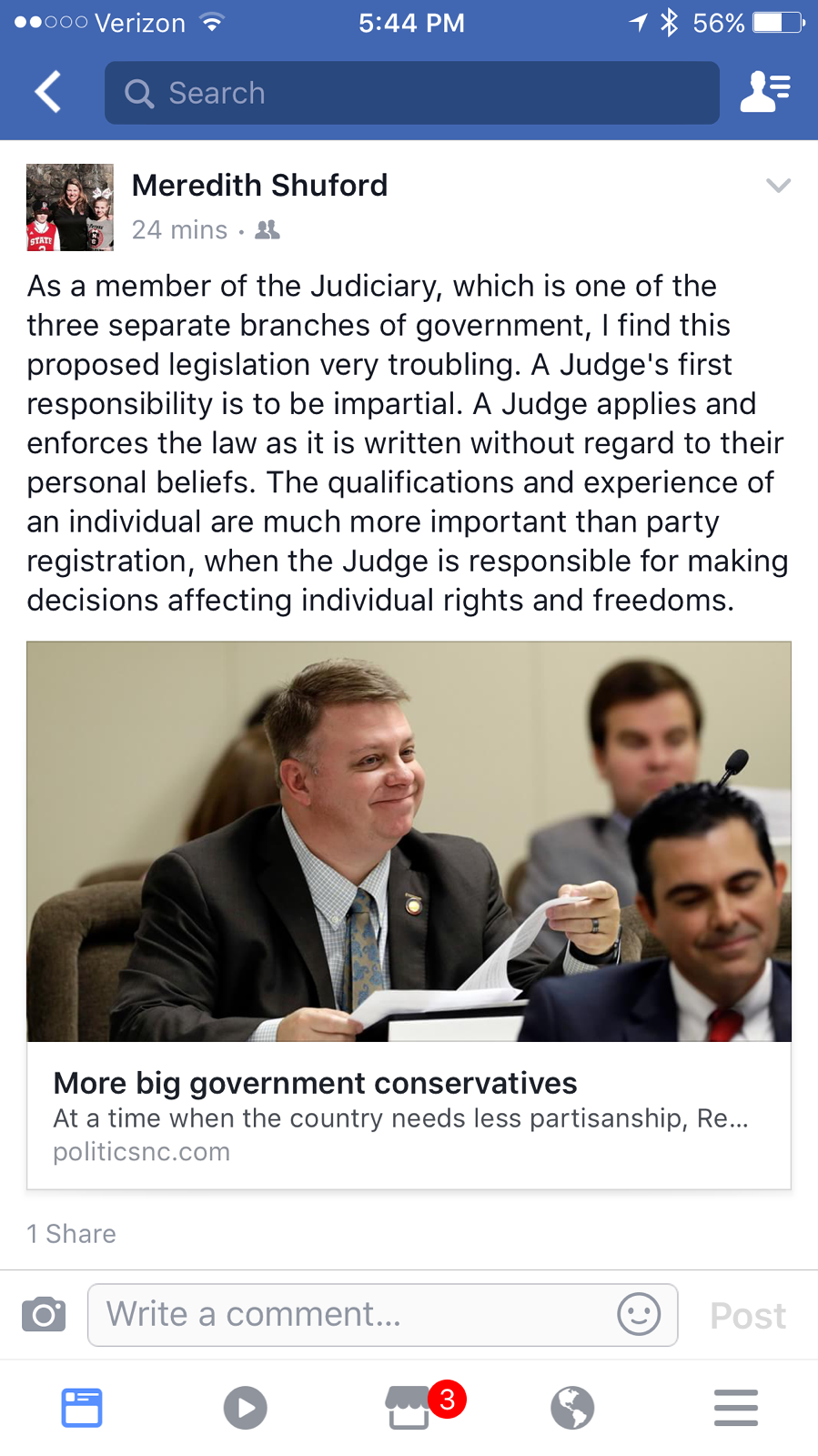A social media post by a judge representing Lincoln and Cleveland counties shows a clear bias against a House bill that would restore partisan elections for District and Superior courts, one of the bill’s sponsors says.
District Court Judge Meredith Shuford caught the attention of Republicans when she posted her opposition to partisan elections on her Facebook page. The post linked to a story from politicsnc.com titled “More big government conservatives.”
Rep. Justin Burr, R-Stanly, a primary sponsor of House Bill 100, has taken issue with the post.
“I think that her post goes exactly to the point of why I’m running the bill, and the fact that judges claim they don’t want to be partisan, but yet they clearly participate in partisan activity,” he said.
“It’s time the voters be fully aware of where [judges] really stand on their political affiliations. I think she’s helped prove the point of why we need the bill,” Burr said.
The Senate Committee on Rules and Operations plans to debate the bills at 1 p.m. Thursday,
Other primary sponsors of Burr’s bill are Jason Saine, R-Lincoln, Dana Bumgardner, R-Gaston, and Cody Henson, R-Transylvania. The bill passed the House Feb. 22. Senate Bill 94, which is in the Senate Rules Committee awaiting a hearing, would make virtually all elections in the state partisan contests. It was introduced by Sen. Ronald Rabin, R-Harnett.

Politicsnc.com is a political blog by longtime Democratic consultant Thomas Mills of Carrboro, who unsuccessfully ran last year as a Democratic candidate for North Carolina’s 8th Congressional District. The post called supporters of H.B. 100 “big government conservatives” who were inserting partisanship needlessly into judicial races. (Conservatives also post on the blog regularly.)
“As a member of the Judiciary, which is one of the three separate branches of government, I find this proposed legislation very troubling. A Judge’s first responsibility is to be impartial. A Judge applies and enforces the law as it is written without regard to their personal beliefs,” Shuford wrote on the post.
“The qualifications and experience of an individual are much more important than party registration, when the Judge is responsible for making decisions affecting individual rights and freedoms,” Shuford wrote.
“Most of these judge candidates go around to their respective political parties, and let them know of their party affiliation, and ask for their party’s help already,” said state Rep. John Blust, R-Guilford, chairman of the House Judiciary II Committee.
“Why not just put on the ballot what the reality for each candidate is?” Blust said. “The candidates are already registered by party in reality. The new bill doesn’t do anything except reveal what already exists,” and restore the partisan nature of the races that existed for Superior Court judges until 1996, and District Court judges until 2001.
Carolyn Dubay is executive director of the state Judicial Standards Commission, which hears and rules on complaints of judicial misconduct.
“Generally speaking, the code would allow judges to speak on a whole host, and communicate their views on a whole host of issues that relate to the administration of justice,” Dubay said. “Really the concern when judges are speaking is that they don’t make comments that would cause litigants who appear before them to question their impartiality in their case.”
The restriction on public comments by judges relates to pending court cases. “We don’t want judges out there offering their views on the merits of cases that might come before them,” Dubay said.
“Whether it’s a good or bad idea to have partisan trial court elections isn’t really the type of issue that’s going to come before a district court judge.”
Burr said a judge weighing in publicly on pending legislation is disconcerting.
“I think she should do what she has to do in every other case, and that’s keep her personal opinions to herself,” Burr said.
Burr sees little political distinction between Shuford voicing her personal opinions on the legislation and the concern GOP lawmakers have “with a lot of judges out there, that there are rulings that are not based on the law but are based on their opinions.” For that reason, voters should be made aware of political affiliations on the ballot, he said.
“If they’re a liberal that likes to legislate from the bench, or if they’re more conservative and somebody who’s going to stick with the rule of law in the legislative branch, I think voters need to know that information,” Burr said.
Senate Bill 94, which passed the House on Feb. 22, is separate legislation that would make virtually all elections in the state partisan contests.